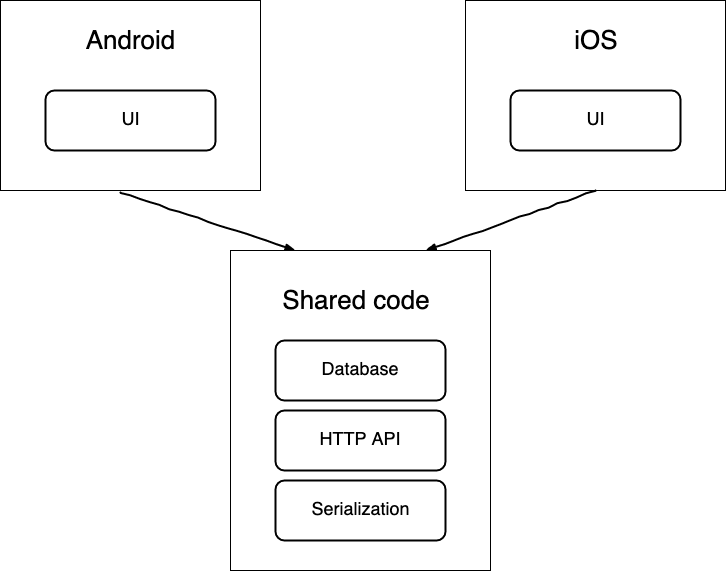MangaKu
🤖
Introduction
MangaKu App Powered by Kotlin Multiplatform Mobile, Jetpack Compose, and SwiftUI
Module
core: data and domain layeriosApp: ios presentation layerandroidApp: android presentation layerbuildSrc:androidAppandcoredependencies
Table of Contents
- Introduction
- Features
- Installation
- Screenshot
- Libraries
- Domain to Presentation
- Expect and Actual
- Project Structure
🦾
Features
A few things you can do with MangaKu:
- View Popular Manga
- Easily search for any Manga
- See Manga Detail
- Save your favorite manga
🚗
Installation
- Follow the KMM Guide by Jetbrains for getting started building a project with KMM.
- Install Kotlin Multiplatform Mobile plugin in Android Studio
- Clone or download the repo
- Rebuild Project
- To run in iOS, Open Xcode and
pod installinsideiosAppfolder to install shared module and ios dependencies
📸
Screenshot
💡
Libraries
core:
iosApp:
androidApp:
- Jetpack Compose
- Accompanist
- Koin
- Some Kotlinx & Jetpack Components
💨
Domain to Presentation
In Android, Because both core and androidApp write in Kotlin, we can simply collect flow :
private fun fetchManga() = viewModelScope.launch {
_uiState.value = UiState(loading = true)
trendingUseCase().collect { result ->
if (result.isNotEmpty()) _uiState.value = UiState(listManga = result)
}
}
But in iOS, we need to deal with swift, here i'm using createPublisher() from KMPNativeCoroutines to collect flow as Publisher in Combine :
private func fetchTrendingManga() {
loading = true
createPublisher(for: trendingUseCase.invokeNative())
.receive(on: DispatchQueue.main)
.sink { completion in
switch completion {
case .finished:
self.loading = false
case .failure(let error):
self.errorMessage = error.localizedDescription
}
} receiveValue: { value in
self.trendingManga = value
}.store(in: &cancellables)
}
🚀
Expect and Actual
in KMM, there is a negative case when there's no support to share code for some feature in both ios and android, and it's expensive to write separately in each module
so the solution is expect and actualexpect inside commonMain and write "actual" implementation with actual inside androidMain and iosMain and then each module will use expect
example:
commonMain/utils/DateFormatter.kt
expect fun formatDate(dateString: String, format: String): String
androidMain/utils/DateFormatter.kt
SimpleDateFormat
actual fun formatDate(dateString: String, format: String): String {
val date = SimpleDateFormat(Constants.formatFromApi).parse(dateString)
val dateFormatter = SimpleDateFormat(format, Locale.getDefault())
return dateFormatter.format(date ?: Date())
}
iosMain/utils/DateFormatter.kt
NSDateFormatter
actual fun formatDate(dateString: String, format: String): String {
val dateFormatter = NSDateFormatter().apply {
dateFormat = Constants.formatFromApi
}
val formatter = NSDateFormatter().apply {
dateFormat = format
locale = NSLocale(localeIdentifier = "id_ID")
}
return formatter.stringFromDate(dateFormatter.dateFromString(dateString) ?: NSDate())
}
yes, we can use Foundation same as what we use in Xcode
🏛
Project Structure
core:
datamapperentityresponse
repositorysourcelocalentity
remoteresponse
didomainmodelrepositoryusecasebrowsedetailmymangasearch
utils
androidApp:
uicomposableshomecomposables
favoritesearchdetail
diutils
iosApp:
DependencyAppMainResourcesReusableViewExtensionsUtilsFeaturesBrowseViews
SearchDetailMyManga





